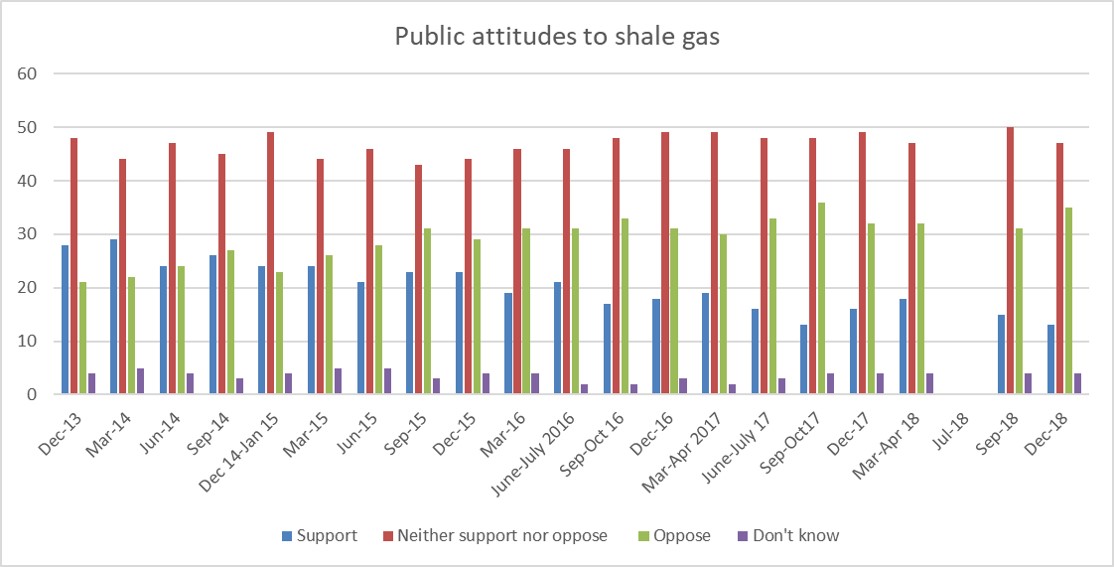
Opposition to fracking has risen to near record levels in the latest government public attitudes survey with a big increase in concern about earthquakes. Support for fracking fell to a joint record low.
The Wave tracker survey, conducted in December 2018, was the first to reflect reaction to fracking at Cuadrilla’s shale gas site at Preston New Road. By the end of the survey period, operations at the site near Blackpool had induced 57 seismic events.
A government-commissioned report, which likened some of the tremors to a bag of flour dropping on the floor and predated the survey, appears not to have reassured participants.
Yesterday, Cuadrilla called for a review of the rules on fracking induced-earthquakes, arguing that it may not be commercially-viable to extract shale gas from Preston New Road within the current limits.
The latest survey, published this morning, also bucked the trend of previous years, which saw a rise in support for fracking and fall in opposition in the winter.
Opposition
According to the latest results, 35% of participants opposed fracking, up from 31% in September 2018. This is the highest level since the record of 36% in September 2017.
Strong opposition was 13%, up one percentage point on the previous survey but down from 16% on the results from a year before.
Who opposes fracking?
As in previous surveys, the more people said they knew about fracking the more likely they were to oppose it. In the latest survey, of those who claimed to know a lot about fracking, 66% opposed and 20% supported it.
People most likely to oppose fracking included participants in social grade AB (42% compared with 27% in social grade DE), home owners (39% compared with 29%/25% for private/social renders), people living in Scotland (50%), Wales (45%), and the north west (41%) and south west (40%) of England.
Why do people oppose fracking?
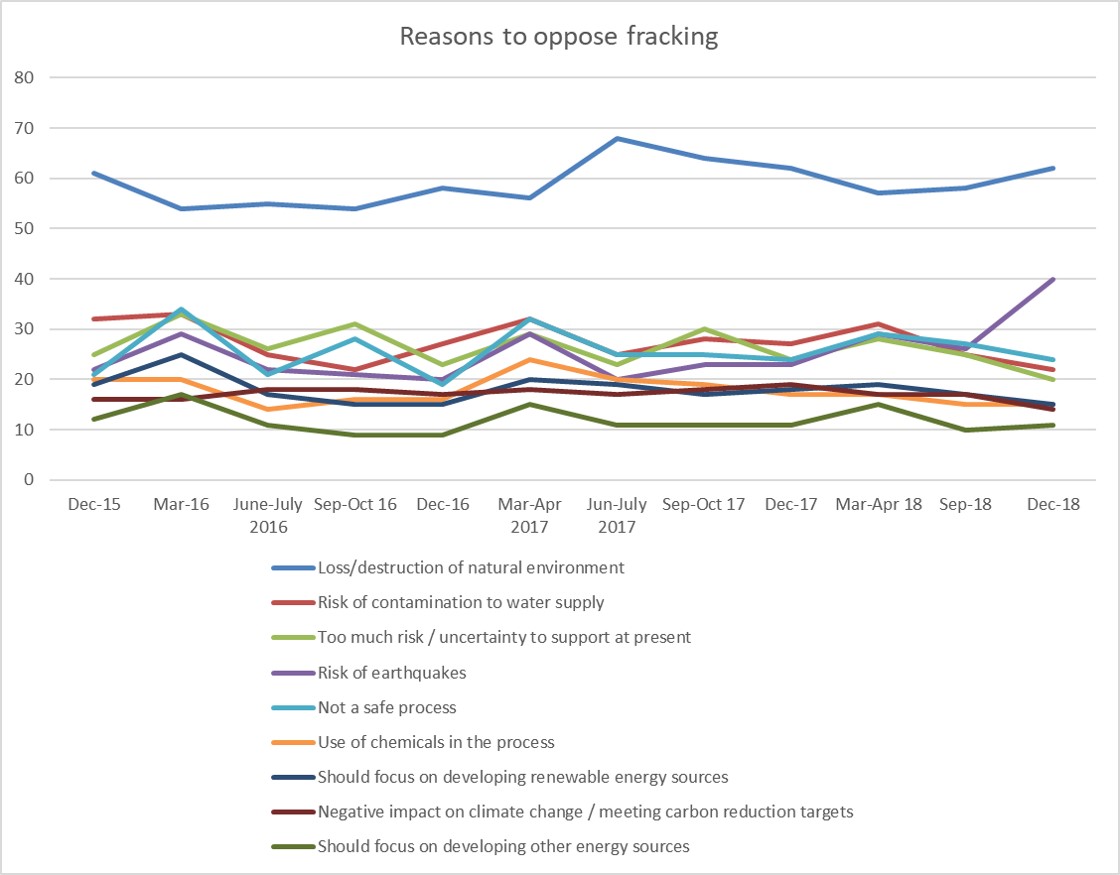
The main reasons why people opposed fracking were:
- Loss or destruction of natural environment (62%, up from 58%)
- Risk of earthquakes (40%, up from 26%)
- Risk of contamination to water supply (22%, down from 25%)
- Too much risk/uncertainty (20%, down from 25%)
- Not a safe process (24%, down from 27%)
- Use of chemicals (unchanged at 15%)
Support
Total support for fracking fell to 13%. This is the lowest level recorded in the survey so far, also reached in September 2017.
The latest figure was down from 15% in the previous survey in September 2018 and 16% for the same time a year before.
Strong support for fracking remained unchanged at 2%.
The gap between support and opposition has increased again. It is now one percentage point short of the record in September 2017.
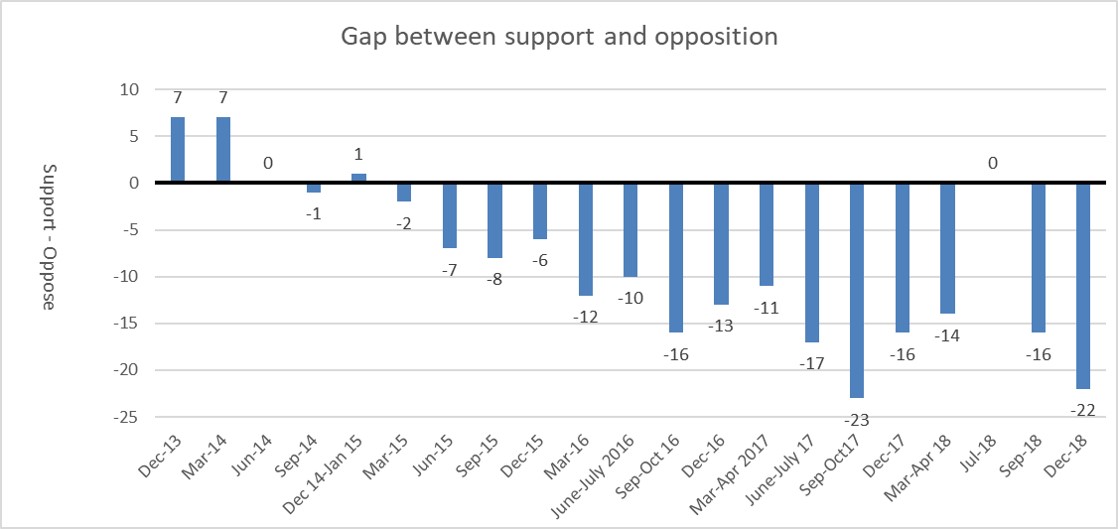
Who supports fracking?
According to the data, men were more likely to support fracking than women (18% compared with 9%). People aged 65 and over were also more likely to support (18% compared with 7% for 35-44 year olds).
Why do people support fracking?
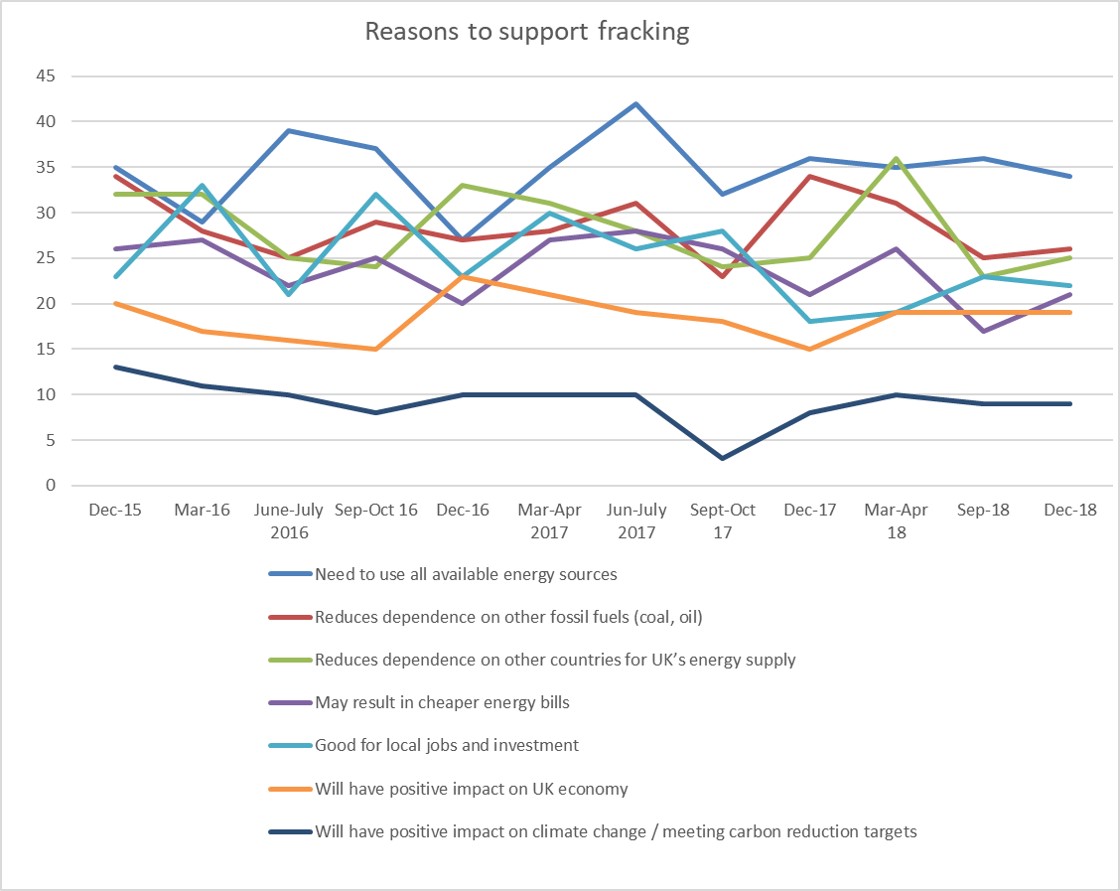
The main reasons people gave for supporting fracking were:
- Need to use all available energy sources (34%, down from 34%)
- Reduces dependence on other fossil fuels (26%, up from 25%)
- Reduces dependence on other countries for UK energy (26%, up from 25%)
- May result in cheaper energy bills (21%, up from 17%)
- Positive impact on the UK economy (static at 19%)
Neither support nor oppose
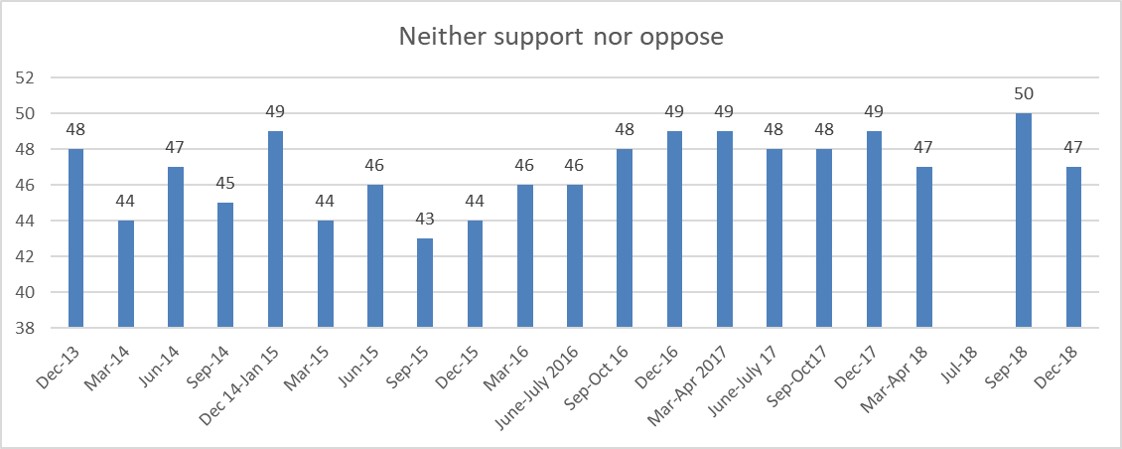
47% of participants neither supported nor opposed fracking. This was back down to a level in March 2018, following an increase to 50% in the previous survey. The main reason given was “don’t know enough about it”.
4% said they did not know whether they supported or opposed, unchanged on the previous survey.
Awareness
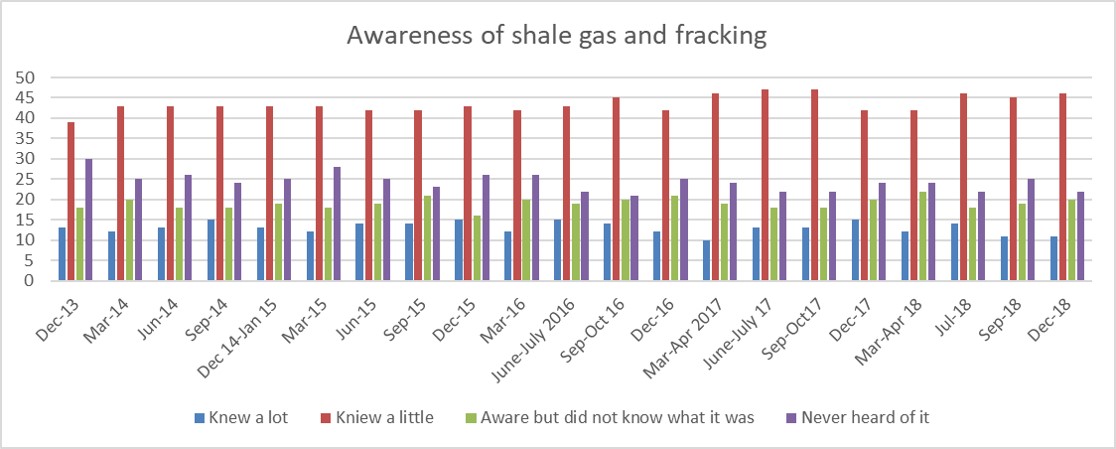
78% of participants were aware of fracking for shale gas. This is the same level as in July 2018 and up slightly from the previous survey.
11% said they knew a lot about fracking (unchanged from the previous survey). 46% said they knew a little and 20% were aware. 22% said they had never heard of fracking, down from 25% in the previous survey.
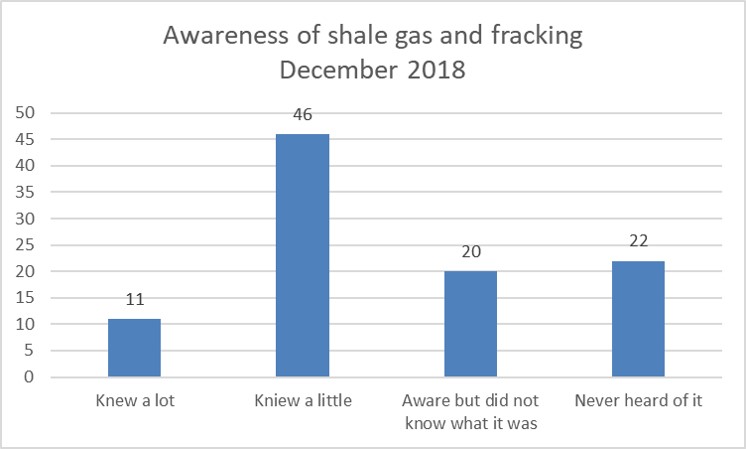
According to the findings, awareness of fracking was higher among participants aged 65 and over (89%, compared with 59% of 16 to 24 year olds), those in social grade AB (90%, compared with 66% in social grade DE), those with household incomes of £50,000 and over (88%, compared with 74% with household incomes under £16,000) and those living in Northern Ireland and the North West (88% and 87% respectively, compared with 59% of those living in London).
Reaction
Daniel Carey-Dawes, Infrastructure Policy Manager at the Campaign to Protect Rural England, said:
“The Government has today met its obligation to protect our environment and the public, by refusing to entertain the desperate calls by industry for a relaxation of regulations on seismic activity as a result of fracking.
“It must now take this damning evidence that fracking does not have the support of the public into consideration as it makes its decision on proposals to fast-track fracking. Perusing this plan would defy local democracy and remove the voices of local communities in decisions over fracking proposals in their area.”
A spokesperson for Frack Free Lancashire said:
“The increased opposition to fracking and drop in support comes as no surprise, considering the large number of seismic events which have been experienced since fracking resumed on the Fylde Coast. Fracking’s unpopularity will also have been increased by people’s distaste for the fracking companies’ bully boy tactics as they have tried to browbeat government into changing the regulations governing the seismic traffic light system.”
Steve Mason from Frack Free United said:
“How can shareholders or any sensible business keep on backing fracking? To continue forging ahead is beginning to look fanatical and totally irresponsible. Fracking is proving to be economically unviable, the industry cannot operate safely under the very same regulations they helped create.
“Fracking threatens industrial wipeout of some of the UK’s most valuable countryside and has no public support. It’s time for a change of direction. Fracking in our communities is never going to be a strategic winner for this country.”
Methodology
The fieldwork was carried out for the Department of Business, Energy and Industrial Strategy from 5-16 December 2018 using the Kantar TNS Omnibus. The results of the Wave 28 tracker were based on face-to-face home interviews with a representative sample of 4,273 households in the UK.
- The survey dropped a question on attitudes to fracking in July 2018 but reinstated it in September 2018.
Categories: Research





In part of a Cuadrilla statement it says “In addition to micro-seismic data Cuadrilla recorded ground vibration levels throughout fracturing operations. The vast majority of those vibrations were less than 0.5 mm/second which the company has highlighted is up to thirty times lower than limits applied to other UK industrial operations, including quarrying and construction.” This shows that their fracking activities actually do create ground level vibrations. Take into account the fact many potential fracking areas have former mine shafts as so far disovered so far by the Coal Authority. Masses of these are built over by roads, paths and differing forms of property or over gardens and public spaces. From Cuadrilla’s claim they will all experience some level of vibrations if underground vertical fracking operations take place (even at levels of below 0.5). So disasters are then possible. Even massively more so if the permitted level of operations is increased by up to 30 times on what is a shattering logarithmic scale. Quarrying unlike fracking does not take place beneath someones living room nor beneath their children’s playing fields.
Harry, we can always look for evidence elsewhere in the world for this – there are many that have mined for many years and have a massive amount of very high magnitude earthquakes. What you are describing has not been noticed in these areas before. You mention mines under roads, the fact is that traffic on those roads posses far more risk to ground stability than even moderate sized earthquakes let along the minor tremors that occur as a result of hydraulic fracture stimulation.
We are constantly told we cannot look at evidence from abroad. That’s the government line on environmental and health aspects. If we take evidence from around the world on this, then we must on all other aspects.
Exactly Steve. then we need to generate the evidence in the UK and that means opening up the TLS.
Totally agree.
Judith : Look up Coal Authority sources to see what has happened on some roads.
Harry – I lived in the area all my life – I know exactly what happened with roads. The main thing is that the tremors related to fracking are so small in comparison to traffic that it’s simply not an issue
Judith : As I am expected to follow the claimed geometric expertise of the James Verdon, perhaps you can do the same with the Coal Authority on how and where sinkholes and the like have been discovered in the past and what have been their likely causes. Although seemingly they have not yet published anything on the likely consequences of fracking. Clearly when fracking takes place under your parents garage and the like there will be some sort of surface impact. Whether it is the equivalant of a car driving out of it, an elephant stamping on it or a bomb hitting it will depend on the impact itself and geometric factors. The Coal Authority periodically inspect places if they hold a record of the mineshafts there. This is shown in their current publication “Modern Law Supplement – Meet the experts”. I accept, however, that all expertise needs challenging. For as John Stuart Mill said, those who only know their own side of the case, know little of that.
Harry – I’ve done a search and have found nothing from the Coal Board on the impact of seismic events on abandoned mine shafts so it’s difficult for me to learn from their expertise on this issue. But if you have a link I’d be more that happy to read it.
Judith : Although the Coal Authority have great expertise on coal mining operations and on their legacy, they are not using these to analyise the likely consequences of the moves towards facking. This is because they are a Government Agency and this Government is basically pro-fracking. So when the Coal Authority are asked to submit evidence on vertical operations sort by INEOS and others, they currently limit themselves to only questioning applications if that are planned to take place within 20 metres of a known former mine shaft. To prevent this criticism happening in relation to its proposals for a site at Bramleymoor Lane near Marsh lane, INEOS adjusted its application to operate a few meters away from its original proposal. If INEOS finally start operations at Bramleymoor Lane and go for horizontal fracking operations (which could come under areas such as Coal Aston and Unstone at least), then will the Coal Authority not raise any concerns ? We wait to see. But what you can cull from their material should concern you when it comes to fracking. I hope that you will pay some attention to the Coal Authority’s Interactive Map.
By the way Harry, I’m a great fan of the coalboards records – they helped the previous company where my partner worked to map out the coal bed methane potential of the UK. This was based on their records of the density of cleat within the coal
Judith, the main thing about the earthquakes created by fracking operators is the really bad stuff goes on deep below ground not felt at the surface!
This is the truth the Melon Mongerors don’t want the public to become aware of!
Peter – event locations tell us exactly where the damage occurs underground. It’s interesting that those with expertise don’t think it’s a big deal whereas those with no expertise argue that such damage is important – is there something that the non-expects know that the experts have missed?
So Judith, you’re calling Mike Hill a non-expert in this matter?
You really don’t know what you are taking about!
He was in the room advising when the earthquake limits were agreed with Cuadrilla and everyone else!
Please leave the discussion.
Peter – that’s very funny. Mike Hill is an electrical engineer – he has no expertise in seismology. The anti-frackers really are pretty clueless about this subject and what does or doesn’t constitute expertise
Judith : I have placed the following comment on James Verdon’s blog.You say he is a relevant expert – Ii do not know whether James Verdon still reads comments on this site, for his last entry in this Comment Box is almost three years old, yet numbers of others have added items since then. I have recently examined a number of his writings via the internet where links are provided via the page which refers to his publications on his University web-site. Including evidence which he and Prof Kendell gave to the Commons Select Committee on Energy and Climate Change. I have concerns about vertical underground fracking operations being undertaken beneath areas which have had large numbers of former mining operations, some dating back for centuries. The Coal Authority Interactive Map reveals many such areas. Yet these places have almost all been been granted PEDLs by the Governmemt for firms such as INEOS who can eventually seek underground vertical fracking rights in such places. Should information which can be obtained via the Coal Authority Interactive Map for such areas not be of concern? There is also a recent publication by the Coal Authority which adds to my concerns and below I link to a blog item of mine about this. I do, however, accept John Stuart Mill’s claim that a person who only knows their own side of the case, knows little of that. So if my fears are seen by an expert to be unfounded, why is this felt to be ? http://threescoreyearsandten.blogspot.com/2019/01/key-coal-authority-information.html
The tube and subway under London cause seismic vibration under building very day. But shale only cause disruption for a week or two during fracking.
Hiding away here to repeat your faux pas from the next page BTW?
Never mind, we see the meme that must be repeated at least once here again dont we boys and girls? Odd behaviour nonetheless?
Oh yes we do!
https://www.bbc.co.uk/news/amp/business-47133564
Unrelated as always Kish, you would do better moaning about Russians and other oppressive regimes like the Norwegians 😉
Pointless Observation Kisheny….
Energy price increases, pointless?
That is the whole result of how our energy is produced, or not produced in this Country…
But unrelated to fracking for Shale in the U.K. This has been done to death Kish with even Pro frack execs agreeing that even with a fully operational shale gas industry in the U.K. retail prices would remain unaffected. The joys of the European energy market.
Retail prices are not only what dictates UK energy prices. How is the winter fuel payment made? Ohh-taxation is taken and then redistributed. Perhaps a larger, more directed winter fuel payment?
Of course, there isn’t a model of that is there? Yes-look to Norway. $1 trillion Sovereign Wealth Fund.
But so invisible without a link!
The joys of UK taxation upon UK industry.
So, yes, related.
Winter fuel payment is naff all to do with retail energy pricing, it’s effect on cost is tiny. Over 80% of a normal consumers gas bill is wholesale cost of utility, distribution costs and other operating costs. Environmental and Social obligations are less than 2% of a bill combined.
Your winter fuel payment argument is a complete red herring. The winter fuel payment is made to all over 65s so the majority of the country don’t get that particular benefit. Furthermore it’s not means tested which in effect means wealthier pensioners would do not need the payments are potentially taking it at the expenses of those who do. Whilst there are reasons for not applying a means test (ie potentially off putting application process) those with decent savings and lifestyles should opt out voluntarily. Do you claim it Merton?
“Perhaps a LARGER, MORE DIRECTED winter fuel payment?”
Hope the larger print enables you to read it, Pavlova.
Obviously, need some extra taxation directed to more frequent eye tests!
I do not need to claim it, it is paid automatically in the UK. DOH.Opting out is a nonsense as it would cost more to operate than it would save. Those who do not need it can more easily donate it to a charity of their choice, and many do. HOWEVER, if a LARGER, MORE DIRECTED winter fuel payment was used you could have a two tier system where those living in fuel poverty, or other situations, received a higher figure and the current system continued for the rest. Could be funded by the taxation upon extra UK industry rather than taxation paid to US industry-as currently.
Sorry to upset the US economy. Less for “them” to spend on donuts-so a double benefit!
You can put individual words in caps to demonstrate your ranty shouty attitude all you like Martine but here is the opening sentence of your original ranting, lifted directly “Retail prices are not only what dictates UK energy prices“ .
I have shot that crap statement to pieces but now you seem to be attempting to squirm away from that opener by stating that a non existent review of the WFA system should be developed.
How does an idea that you have come up with to increase the winter payment allowance affect CURRENT UK. retail energy prices? That’s the question?
Floundering and grasping for a life line to save your blushes. When in a hole stop digging.
Well, Pavlova, IF YOU HAD AN ENERGY BILL OF £500 OVER 6 WINTER MONTHS AND THERE WAS AN UPPER TIER WINTER FUEL ALLOWANCE OF PERHAPS £400 then would your current energy price be reduced???
I suggest it would be decreased to £100.
If your energy bill was higher at £800 for the 6 months then it would be reduced to £400.
Quite straight forward. All that needs adding, is how you fund it-and I have suggested one mechanism-and who determines who should receive it which is no more difficult than determining who has access to a Food Bank.
Now, if you can not do the maths. or read the text, then someone could do it for you.
Not expecting you to agree that it could be done, because at the end of the day that would mean your argument that UK produced gas and oil offers no advantage against imported gas and oil was rubbish.
But for those who can read and do the maths. and see what can be done elsewhere-without having to have links to do so-then they may see it does add up and is a way fuel poverty could be removed.
Here’s a break down of a retail gas bill.
Other direct costs 1.20%
Environmental and social obligation costs 1.35%
VAT 4.76%
Supplier pre-tax margin 8.68%
Operating costs 19.58%
Networks 25.42%
Wholesale costs 39.02%
Reblogged this on Wessex Solidarity.
Surprising that there are so few of those opposing fracking who adduce climate change as a reason. Surprising too that so many respondents assert that they have never heard of fracking.
Not really iaith. That’s what you get with minority groups. They feel because they make the most noise they represent the majority, but as shown in this instance, they do not, and the majority are usually silent, hence the widely known phrase.
Maybe the majority do see items such as Britain now importing more oil from US fracking, than from any source, and therefore see that climate change is not the issue whilst that is happening instead of maximising UK production. They may be silent, but they hear and see.
Standard MC deliberate misreading of Wave survey results. You could near enough set your watch by these now they are that regular.
Not been a good week for profractavists has it Marty. Chin up flower.
Misreading? Nope. 60% are not against fracking, which is currently authorised in England. So, no mandate indicated against. Not bad, considering this is a technology which has not yet shown the benefits side of the equation.
Yes, the watch is appropriate. Time you antis stopped being so desperate to claim the Wave survey is showing something it is not. When you do that with something that is black and white to those who have any knowledge about market research, how you think they are judging statements around areas that are not black and white? It is the same with activities like calling out the emergency services without consultation. All you do is stop those who are neither for or against moving to against because they then doubt all other statements.
As I have said before, exciting your own may stop them getting bored, but it is doing nothing to convince others. So continue.
Quite a good week, Pavlova. Premature excitement from some, but that’s routine now. You do realise the Dept. has declined to confirm there will not be a review?
Not again Martin, the same old argument. Neither for or against means just that. It means 60% have not formed an opinion either way. But what we do know is that the more people learn about fracking the more likely they are to oppose it, which is very damning for the industry. And of those surveyed that have formed an opinion, the majority oppose it. So the figures speak for themselves.
KatT – the 60% figures is very similar to that when people are surveyed with regards to attitudes to GM food. 20% totally agree, 20% disagree and 60% are inbetween. Of the 20% who like GM most have a strong science background and 60% are male. Of those who disagree, most have a non science background and 60% are female. It sounds very similar to the make up of attitudes towards fracking
Judith I’m sure you spotted that it is 47% that remain undecided, Martin has added the percentage that support to arrive at the 60%, so it isn’t statistically accurate to claim 60% don’t oppose fracking.
Why not KatT. Please explain.
There is a group who support fracking ie. they are not against it.
There is a group who do not support, or oppose it ie. they are not against it.
You just want to rub that second group away because it suits your purpose, but that is not the way market research works.
You may have a way through if fracking was not allowed, then you could say the majority was not in favour of allowing it. But, that is not the current situation where fracking is allowed and the majority are not in favour of changing that. Tough for you, but with a group who oppose something where the majority don’t know much about it, then to add the same approach to Market Research shows a pattern, but not a very good one.
Read the results again and your post of 6.17pm. That is exactly what the Survey says.
The nearer the frackers come to people’s Communities, the more active the frackers propaganda becomes in that locality.
The more people investigate the fracking pros and cons, the more actively anti-fracking they become as the survival gene kicks in!
Yes, the same analyses, because the same data is produced.
Strange KatT, only 11% claimed to know a lot about fracking. So, there seems to be around two thirds of the antis who don’t know much about it, but are against it! Yes, the figures speak for themselves. They show that a lot of people, if they don’t know much about a subject, do not form an opinion for or against. Is says the antis are predominantly making a judgement without understanding why! Not a very strong base.
Judith is correct. Research recently published regarding GM showed exactly the same.
“Declined to confirm there will not be a review” – oh dear could that be anymore tenuous. It’s nearly as bad as claiming “neither for nor against” from the tracker is in anyway a positive affirmation.
You are getting more desperate by the hour and consequently more entertaining McFly.
Keep up the good work as DoD would be a much duller but ultimately much more credible place without your baseless insights.
[Typo corrected at poster’s request]
Except Martin didn’t say it was a positive affirmation. Martin said no market research wipes away the group that is neither for or against. It includes them in the analyses.
Credible?? Ahh, changing what is stated to prove a point. Incredible.
But no one has noticed who and what upsets the antis so much they always have to bring out the same characters to try and discredit, and simply expose what their problems are.
Oh yes they have.
So Martin is now talking about Martin….you have a twin? OMG
Maybe-but not a pudding!
No pudding but definitely a donut 🍩.
Welcome to the UK Pavlova. We call them doughnuts.
No wonder the link was hard to find!
Oops.
Why couldn’t the fracky bear eat his donut?
Because he was stuffed!
The shortened donut has been around since the late 1800s, but it wasn’t popularized until the late 20th century, when the successful American doughnut chain Dunkin’ Donuts made it ubiquitous.
Ooooh your gammon is showing Merton. Snide comments about nationality on the basis of a predictive text spelling how very Farage of you.
So, you don’t bother to check things, Pavlova?
Adds up.
Reblogged this on sdbast.
Drill or Drop who are you surveying, the people who attended the coffee morning?
Eli you do know this is a Government survey don’t you? Not one undertaken by DoD
ElI-Goth – I bet a lot of them had soya milk in their coffee
Where as you appear to like your coffee bitter.
The survey is carried out on behalf of the government by a professional polling organisation, Kantar TNS omnibus. In this case the survey was carried out face to face in people’s homes with a sample of 4273 households. So no, not a coffee morning.
IGas shares, AJ lucas Group shares and Angus Energy Shares are all rock bottom. No coincidence. Speculators, by their very nature will move on to something which they believe to be reliable. Does anyone remember Cameron’s Dash for Gas? It seems such a long time ago and it has not even managed a very slow crawl for gas.
BP looking quite good Waffle. Wonder why. Oh, fracking-for one.
But you are correct about AIM shares-that’s the way they go, especially with regards to companies that are exploring.
But not fracking in the U.K. Martin
But fracking in USA, for UK to import the end product-now the biggest source of UK imported oil. Environmentally, that is a nonsense.
How did they get involved in fracking in USA? They initially decided it wasn’t going to be successful, and kept away. They made a mistake, and then had to rectify it with an expensive acquisition.
Maybe they will do the same again in UK?
Or Trumpy will run for PM and build a wall on the island of Ireland
London & anthropogenic siesmic activity. Just for context – much more felt in London every 24 hrs than anything Preese hall or PNR have caused. https://core.ac.uk/download/pdf/82918644.pdf
But it’s what lies beneath…..
Sherwulfe and your point is? Or are you just trying to have the last word?
Are you? And your point is?
Well, Sherwulfe , I would have hoped you would have been able to give an expert & informed opinion of the comparison between anthropogenic seismicity which is felt by millions of people daily in London, than the tiny surface effect of siesmicity from Preese Hall & PNR. But I understand why if you wish to avoid giving one.
But isn’t that what you usually do? Wouldn’t like to step on your tootsies….